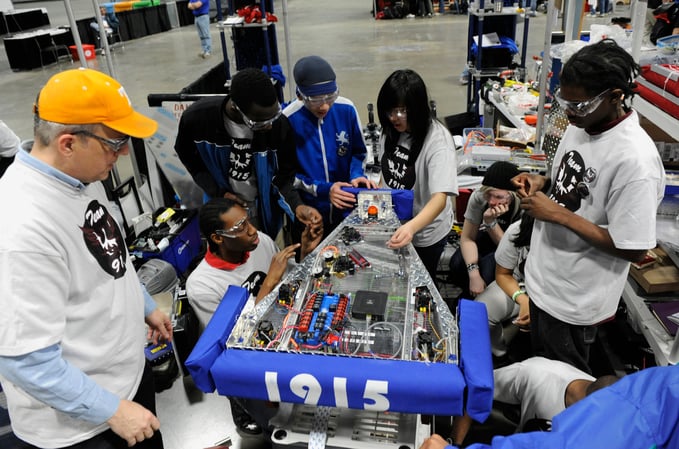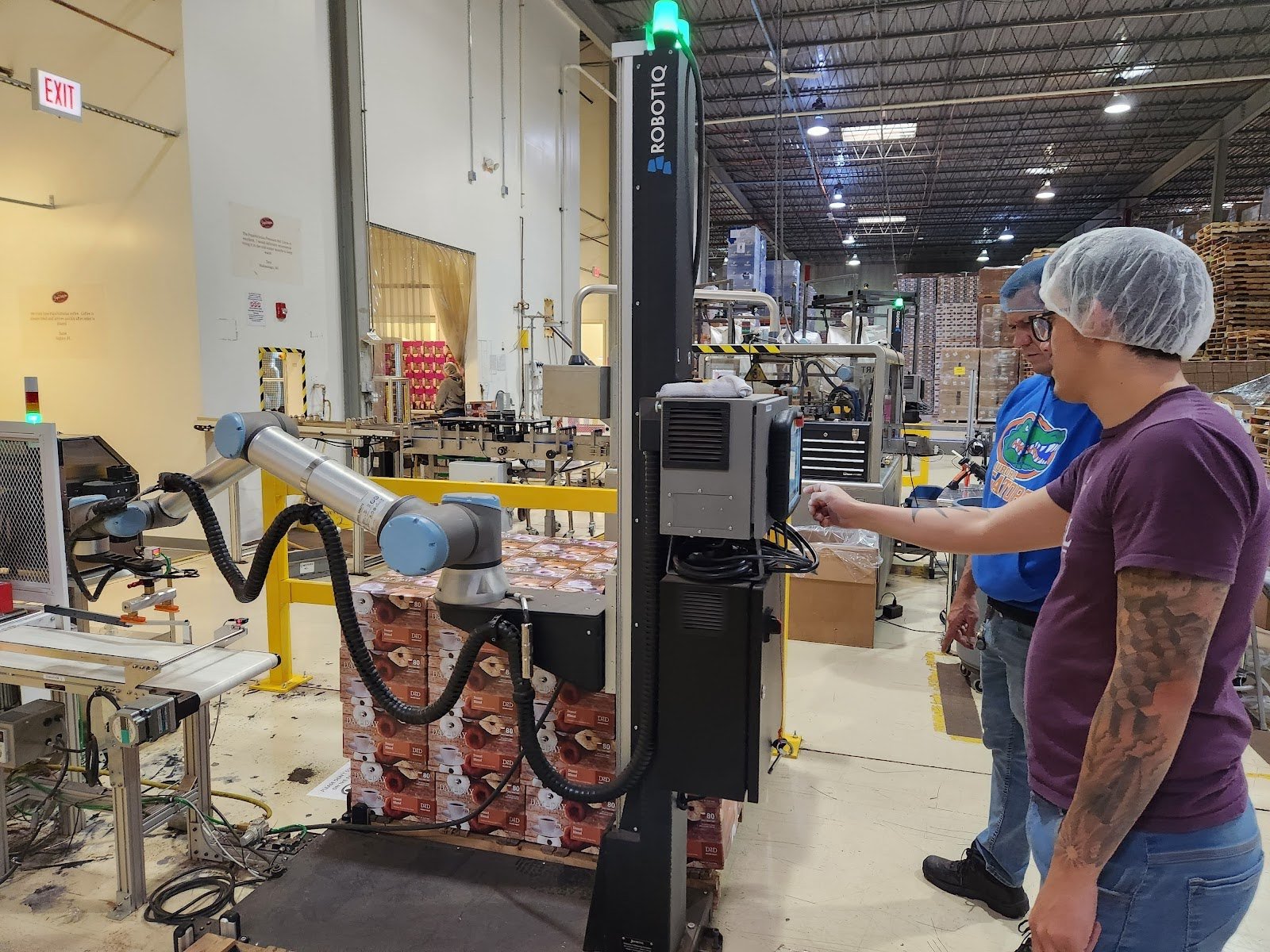How to Pick a Robotics Degree Course: Which Specialism?

It's very challenging to pick a robotics degree course. You know you want a career in robotics (or maybe you're not sure), but which specialism should you pick? Perhaps you're already part way into a degree and you want to specialize in robotics. Which electives should you choose? Which Masters degree? There are so many questions and nobody seems to have the answers! If you're in this position, this is the post for you. In the first of a two part series, we help you out with some tips on how to make this big life decision.
One of our most popular articles on this blog is "What To Study for a Career in Robotics?" If you haven't read it yet, make sure to check it out, as it gives an introduction to what topics might make up a robotics degree (spoiler alert: there is a big range of topics).
The article has attracted lots of great questions from you and your fellow readers. Many of you are in the position that you're interested in robotics, but are unsure which specialism to choose for your degree course.
In this article, and the following one, my basic advice is this: Go with what feels right and follow your instincts. But, how do you decide what "feels right" when there are so many options? In this article, I'm going to give you some practical steps you can take to decide which specialism is right for you.
Why You Should Not Take My Advice (or Anyone Else's)
Before I go on, here's a bit of a disclaimer:
I can't make the decision for you. There is no "right" answer as to which degree course you should choose. Ultimately, the decision is yours.
I know it's hard.
I remember how difficult it was for me to pick a degree course. I can understand if you feel like you just want someone to tell you "Do this course, it's the best one" but the truth is there is no such thing as the perfect course for everyone. If anyone does give you a suggestion, make sure that you use the techniques in these two articles to carefully consider if the course is really right for you before deciding to choose it. You are the only person who knows what is most important to you.
The Four Big Decisions in Choosing a Course
Choosing a degree course is a difficult decision because it's actually made up of several different decisions. They all feel life-changing and you have to make all of them at the same time. Four of these decisions are:
 What subject am I passionate enough about to study for the next two to seven years of my life?
What subject am I passionate enough about to study for the next two to seven years of my life?- What type of course should I choose to have the career that I want? (which leads to the question: What career do I want!?)
- Which specific degree course is the best one for me?
- Where do I want to live for the next two to seven years of my life?
If reading these questions makes you want to run and hide under the bed, I understand. However, I'm going to let you in on a little secret - although they seem like "all or nothing" decisions (i.e. "if I choose the wrong way, my life will be terrible") the outcomes are not so black and white. The real value of any course is determined by how much you put into it. If you have enough passion and interest in the subject to carry you through the difficult parts (there will be difficult times during your course) then you can make the most of almost any degree.
In the rest of this article, I'm going to focus on the first big decision - deciding which robotics subject you are most passionate about. In the next article, we will look at the second and third decisions, which will help you to choose a specific degree course. The final decision (deciding where you want to live) is a bit non-technical for this blog. Nevertheless, it is a very important decision. There's more to life than study.
A Ten Step Technique for Choosing a Specialism
As we talked about in the previous post, robotics overlaps a few disciplines (mostly Mechanical Engineering, Electrical and Electronic Engineering, and Computer Science). You could specialize in any of these, or even something else, for a career in robotics. Which you pick really depends on what part of robotics you are most interested in.
Leonardo, Carlos and Joe all asked how to choose between different disciplines. Leonardo was torn between Medicine, Mechanical or Electrical Engineering and Computer Science. Carlos couldn't decide if he should do a Bachelors in Electrical Engineering then a Masters in Computer Science, or if he should do it the other way around. Joe was trying to decide between Mechatronics (which is combined Electronic and Mechanical Engineering), pure Electrical Engineering and Computer Science.
All of these are great ways to start a career in robotics. But, how can they find which subject they're most passionate about?
How to Uncover Your Interests: Browse a Library
Here's a fun little exercise you can use to start thinking about which subject area interests you most. It involves going to the library or a bookstore. If you can, go to a local university library or a student bookstore, as they are likely to have more technical books relating to many topics.
This is actually a cool thing to do when you're visiting a university on an open day. Turn up an hour earlier than the formal tour (or stay an extra hour after it) to explore the university and try this technique in their library.
If you can't access a university library then a big public library or bookstore will be fine. However, it should be a physical building if possible. I don't know why, but the technique doesn't really work with an online bookstore.
- Allow yourself between 20 minutes and an hour to calmly walk around the library or bookstore.
- Either take out your cell-phone (put it on silent) and open up the camera, or use a pen and a notebook.
- Go to the non-fiction section of the library or bookstore and calmly walk around it, scanning the shelves with your eyes.
- When you see a book that makes you feel "That looks interesting," even just a little bit, take a photo of the spine or write down the name of the book in your notebook.
- Don't get distracted by reading the books! Just take the photo or write it in the notebook and keep browsing.
- If there is any particular book you see which makes you think "I must get that book! I absolutely have to read it" then double underline the name of it in your notebook. If you are using photos, just take a second photo of the same book.
- When you have photographed a book, forget about it. Just clear your mind and continue to browse.
- Don't restrict yourself to just one area of the library or bookstore. Try browsing some other areas as well. Robotics can span lots of different fields, so keep an open mind.
- When you have finished, sit down and relax. Why not buy yourself a coffee?
- Calmly flick through the photos you have taken or read your notebook. Which topics come up the most often? Are they more focused on one type of engineering, or maybe on a different field entirely? In which topics have you underlined the most books? Do any of the books still make you feel excited now, when looking at the photo of them?
If you want to get technical about this (I would because I'm a bit of a statistics geek) you could count up the number of books for each topic, giving double points to the underlined books. Then, you could calculate your "percentage level of interest" for each of the topics.
If you have been honest with this technique, you will see that you gravitate towards particular topics. For me, those topics were programming and electronics. However, just because you have more interest in these topics now, don't restrict yourself to a degree just because it has another focus. Despite my interests being more electronic, my degree was largely mechanical engineering, and it was totally worth it. During the degree, I became interested in many new topics. You will too, but it's a good place to start.
This Is Just the Beginning…
Of course, this technique is only a starting point. There are more factors you have to consider before you finally decide on a degree course. In the next article, I will answer some of the most popular questions we have been asked about picking a degree. I will also give you another great technique which you can use to decide between two, or more, specific degree courses.
Which topics did you gravitate towards when you tried this technique? What challenges have you faced when picking a degree? Have you got any advice for people trying to pick a course? Tell us in the comments below or join the discussion on LinkedIn, Twitter or Facebook.

 What subject am I passionate enough about to study for the next two to seven years of my life?
What subject am I passionate enough about to study for the next two to seven years of my life?






Leave a comment